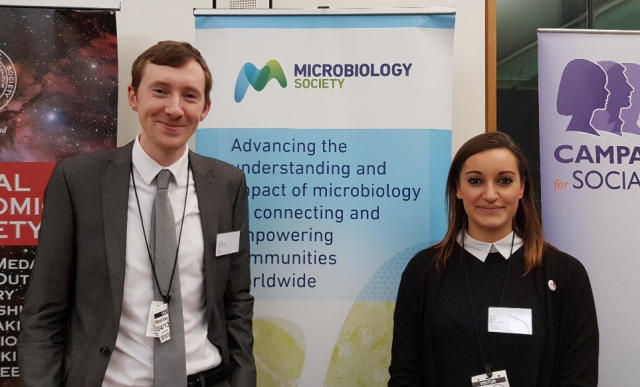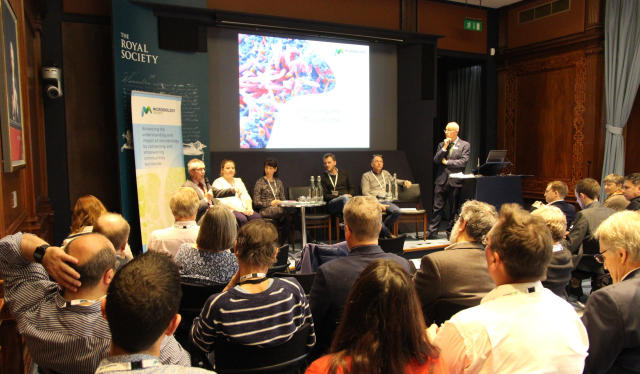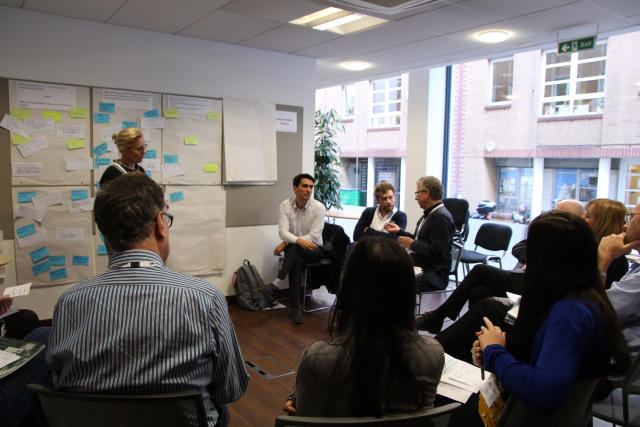Science in Parliament: Unlocking the Microbiome
Posted on May 9, 2018 by Paul Richards
In the new issue of Science in Parliament magazine, our Policy Team write about the Microbiology Society’s Unlocking the Microbiome report, which outlines opportunities and challenges of microbiome research for health, agriculture, environment and biotechnology, reposted here. Science in Parliament is the magazine of the Parliamentary and Scientific Committee, which provides a liaison between UK Parliamentarians and scientific bodies, science-based industry and the academic world. The Society is a Member Organisation of the Committee; Society members can request a full copy of Science in Parliament magazine from [email protected].
Exploring and exploiting microbiomes is a rapidly emerging area of microbiological science and innovation. Dr Paul Richards and Roya Ziaie in the Policy team at the Microbiology Society explain how the Society’s recently published policy report Unlocking the Microbiome identifies opportunities and challenges of microbiome research for health, agriculture and biotechnology.

Microbes are everywhere and affect almost all aspects of our lives. We cannot see them, but our world would not function without them. Bacteria, viruses, fungi, protists, archaea, algae and other microscopic life forms are on us and in us, in the air, soil and water, and in our food.
They are in and on the surfaces of everything in our homes, workplaces and other environments. Most do not harm us and many are essential for the good health of humans, animals and the planet. Microbes help keep the planet healthy by recycling waste and supplying nutrients. Agricultural systems would not function without some while others are harmful pests. Industry uses microbial processes to produce foodstuffs and drugs, benefiting society and creating wealth.
Yet microbiomes, including the microbes and their genes, present largely unexplored resources for better understanding disease and environmental processes, and discovering many more useful functions and compounds for industry and biomedicine.
Advances in technologies such as microbial genomics alongside approaches bringing together skills and knowledge across disciplines such as bioinformatics, microbiology and biochemistry are now enabling researchers around the world to better explore, understand and harness the diversity and functions of microbiomes. This is leading to new discoveries and helping tackle challenges such as antimicrobial resistance, food security and sustainability.
Our growing knowledge of microbiomes is not just receiving attention from scientists, but also industry, funders, regulators, and end-users such as clinicians and the public. In 2016 the USA launched a National Microbiome Initiative; the European Union invested over €1.4 billion in microbiome-related research between 2007 and 2015; and UK Research Council BBSRC with other partners has invested in the £75 million Quadram Institute for Food and Health, which has the microbiome as a focus.
Recognising the growing interest in microbiomes, the Microbiology Society has published a report – Unlocking the Microbiome. Informed in consultation with a wide-range of experts in the UK and Republic of Ireland, the report makes 10 recommendations about how scientists, decisionmakers, industry and other stakeholders can collaborate to progress microbiome research.

Whether working on microbiomes in humans, livestock or soils, it is clear the research community see common opportunities and challenges.
The human microbiome, particularly the gut microbiome, has received the most attention. Scientists are now able to investigate in much greater detail the important functions of the human microbiome, including its role in digestion and nutrition, and the protection it provides against pathogens. There is interest in how factors such as genetics, diet, antibiotics, and even birthing approaches affect the development of the microbiome from infancy to old age. Links have been found between changes in the microbiome and a variety of diseases including chronic respiratory conditions, obesity, inflammatory bowel diseases, antibiotic-resistant infections and even mental health.
While much more research is needed into these links, priority is being given by scientists and industry to target the microbiome to develop novel diagnostics, therapeutics to treat and prevent disease, and interventions and nutritional products to promote health.
Tackling the global challenge of antimicrobial drug-resistant infections is one area of focus. Scientists are exploring the potential to reduce antibiotic usage, for example, using prebiotics and probiotics to promote microbiome diversity and functions that protect against infection; and developing novel antimicrobial biotechnologies such as bacteriophage to target drug resistant bacteria without affecting the rest of the microbiome.
Faecal Microbiota Transplant (FMT) from healthy donors to treat patients suffering from antibiotic-resistant Clostridium difficile infection is perhaps the current main example of microbiome research beginning to be translated into the clinic. However, with FMT and other potential novel microbiome therapeutics and products, ongoing discussions are required about regulation and clinical governance.
The potential role for the microbiome in the development and treatment of some cancers has also been gaining interest. Evidence that the gut microbiome can affect people’s responses to cancer treatments, has raised the possibility of modulating the microbiome to improve patient outcomes.
Like research on the human microbiome, there is a growing focus on building knowledge of livestock microbiomes with a view to improve animal health and productivity and reduce transmission of foodborne disease. There is even the potential to modulate rumen microbiomes with diet to reduce greenhouse gas emissions.
Agricultural interest also extends to crops, with scientists building knowledge of soil and plant microbiomes ultimately to inform farming practices and develop biotechnologies such as biopesticides and biofertilisers to enable more sustainable farming. Recognising this potential, Centre for Agriculture and Biosciences International (CABI) and Rothamsted Research recently launched a UK Plant Microbiome Initiative, with a focus on building industry-academic links. Our report highlights the importance of building such links to progress all areas of microbiome research and translation.
We also heard from scientists hoping to use genomics and approaches like synthetic biology to optimise microbiomes used in industrial biotechnology, such as anaerobic digestion to produce bioenergy.

Microbiologists are investigating largely unexplored microbiomes in oceans and other environments for useful microbes and microbial genes that could be used for industry, medicine and bioremediation of pollution, and to better understand the impact of climate change.
Building the scientific evidence base will be key to future translation of microbiome research. In health, more research is needed on links between the microbiome and different diseases, using data gathered from much larger numbers of people, both to assess if changes in the microbiome are a contributing cause and/or result of a disease, and to identify underlying biological mechanisms. Such knowledge will be vital to identify targets for new therapies and reliable biomarkers for diagnostics.
Scientists and other stakeholders we consulted highlighted the need for researchers to work with industry, funders, learned societies and other stakeholders to develop research skills, infrastructures and capabilities to address microbiome knowledge gaps and opportunities. One need identified was addressing skills gaps such as in bioinformatics and microbiology. Increasing support for interdisciplinary research collaborations and knowledge exchange at local, national and international level was another.
Decision-makers and scientists increasingly recognise the need for a ‘One Health’ approach spanning health, agri-food and the environment to tackle challenges such as antimicrobial resistance. The interface between these areas perhaps presents some of the most exciting opportunities for future innovation, such as enhancing knowledge of microbiomes from farm to fork to our guts to improve nutrition, health and food safety and quality.
Improving sharing and access to data and resources will also be vital to ensure researchers can access well-maintained and accurate datasets and biobanks. A positive example highlighted to us was the Medical Research Council’s Cloud Infrastructure forMicrobial Bioinformatics (MRC CLIMB), providing free microbial informatics storage and analysis tools for UK microbiologists.
Similarly, developing best practices and standards to minimise variability between sampling, analysis and data collection techniques is seen as essential for progressing microbiome research, enabling high-quality, reproducible and comparative research across the community.
Our increasing knowledge of microbiomes could have significant impacts and implications for society. Scientists need to work with policy-makers, educators, journalists and the public to ensure that the potential of this emerging science and innovation is communicated accurately, people are enabled to make informed decisions about medical interventions and products, and scientists are always regarded as a trusted source of information. At the launch of our report, it was interesting to hear from researchers at the University of Oxford who have been engaging members of the public in microbiome research and exploring issues social science can help address.
Importantly, we want to see action on some of the recommendations we have made. In 2018 we will be working with our community and other stakeholders to help address some of the opportunities and challenges they have identified and would welcome hearing from anyone with an interest microbiome science and microbiology more generally.
The Society’s Unlocking the Microbiome report and related policy briefings are available here.

